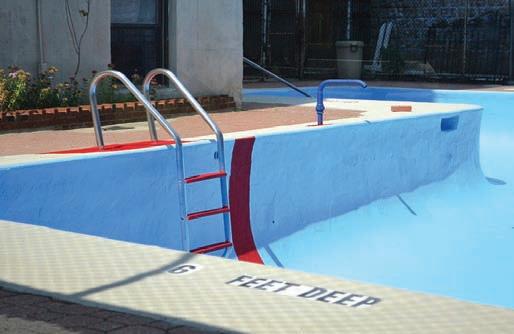
31 minute read
Summer Bummer
Summer Bummer Camps, parks, fairs cancel due to COVID-19.
WIKIPEDIA
Advertisement
MAYA GOLDMAN AND CORRIE COLF STAFF WRITERS A s summer draws nearer, communities around the country are continuing to feel the effects of the coronavirus pandemic and social distancing. While children are still grappling with the loss of the school year, their summer experience is now facing the same pressure.
Many local families suddenly have large holes in their schedules. First, Tamarack Camps announced their closure; then others followed. Here are some of the organizations that have canceled their summer plans.

UNION FOR REFORM JUDAISM CANCELS ALL SUMMER PROGRAMS
URJ announced the cancellation of their 2020 summer programming on April 30. URJ runs 15 summer camps spread throughout the country, as well as teen travel programs to Israel and other locations around the globe. They are also the parent organization for NFTY youth groups, which run their own summer events and activities. There are 12 NFTY youth groups centered around Michigan congregations.
While children cannot physically come to camp, URJ plans to host virtual programming and events throughout the summer. Families who have already paid for URJ summer programs will have the option to choose a refund, credit fees forward to future programs or convert program tuition into a donation.
CAMP RAMAH IN CANADA CLOSES FIRST SUMMER SESSION
Camp Ramah in Canada, a sleepaway destination in Ontario that attracts many Michigander campers, has canceled its first summer session and is waiting until June to decide on the rest of summer. The camp is run through the Ramah Camping Network, a large group of summer camps affiliated with the United Synagogue of Conservative Judaism that have locations throughout the United States, Canada and Israel. The camp offers 10 different sessions tailored for children grades 1-10. They also offer the Tikvah Program, an overnight summer camping experience for Jewish children ages 12-21 with special needs.
Camp Ramah in Wisconsin, located in Conover, still plans on opening but has delayed the start of its summer session to June 30.
HUNTINGTON WOODS CANCELS CAMPS AND RECREATIONAL PROGRAMS
On May 1, the city of Huntington Woods announced it would cancel its summer camps and recreational programming, all Fourth of July festivities and its summer Concert in the Park series. The city’s pool will also not open this summer.
The Parks and Recreation Department plans to create virtual activities for families, and the Huntington Woods library has digital programming already put in place.
ANN ARBOR ART FAIR CANCELS ANNUAL EVENT
The Ann Arbor Art Fair, which was scheduled July 16-19, was canceled on May 7. This is the first time the art fair has been canceled in 60 years. Fair organizers plan to promote each of the artists online. (Jewish News parent company Renaissance Media produces the fair’s annual print guide.)
OTHER SUMMER PLANS
Southfield has canceled all city events until May 15 or further notice.
The West Bloomfield Parks and Recreation Department has canceled all activities until May 31, and their Recreation Activities Center is currently closed through June 8. West Bloomfield’s summer camp registration has been postponed until May 18.
The Jewish Community Center Day Camps, powered by Tamarack, released a statement May 4 saying they are "cautiously planning” on proceeding with their summer.
Focusing on Seniors Oakland County begins COVID-19 testing at senior living centers.
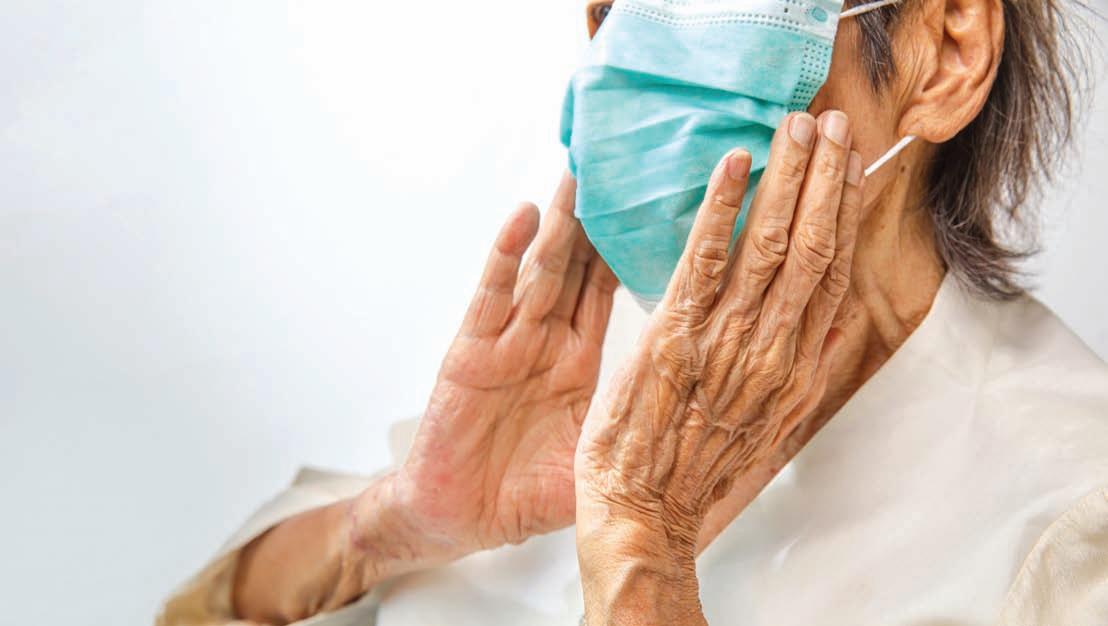
CORRIE COLF STAFF WRITER
In a partnership with local medics, Oakland County has begun implementing novel coronavirus testing for all residents and staff members at senior independent living facilities throughout the county.
Oakland County Executive David Coulter announced this initiative during a press conference April 30.
According to Kathy Forzley, Director of Oakland County Health and Human Services, 137 senior living facilities in the county have been impacted by COVID-19. Across these facilities, there have been 1,377 reported cases among residents, 373 additional cases among staff members and 346 cases had resulted in fatalities as of April 29.
“Testing is really critical in our senior living facilities. We know this is one of the most vulnerable populations,” Coulter said during the press conference. “We have formed a partnership with our local EMS workers to test every resident and staff member in our priority facilities.”
Throughout the course of the pandemic, Oakland County has remained in constant contact with all senior living facilities throughout the area. The health division has a staff task force that contacts each facility twice a week to gather information and resource requests.
The county has already begun testing at facilities in West Bloomfield, Southfield and Birmingham. The initiative will continue throughout the coming weeks to other areas throughout Oakland County.
“We have made our focus for comprehensive testing efforts on independent living facilities first. These are senior communities with apartment-style living,” Forzley said during the press conference. “Unlike other facilities such as skilled care or nursing homes, they don’t have the same capabilities in terms of medical staffing or capabilities to conduct large scale testing on site.”
If residents test positive for the virus, they will be isolated and receive medical care. The health division will also conduct contact tracing on anyone who tests positive to determine who they have been in contact with. Those close contacts will also be asked to self-isolate and monitor symptoms for 14 days.
“The bottom line for this testing is that it is so important for our senior care living facilities to identify the presence of asymptomatic residents and staff that may be unknowingly carrying a risk of exposure through their communities,” Forzley said.
On April 29, All Seasons of West Bloomfield had the health department onsite performing the tests on all residents, staff members and private caregivers/resident assistants. The facility reported their first case of COVID-19 in mid-March.
“Oakland County has graciously offered to provide testing for all residents, team members and private duty caregivers/resident assistants,” Adam Snyder, Vice President of Senior Living at All Seasons, said in a statement. “We, of course, accepted this offer and felt this would be a monumental step in reopening our community over the next few weeks.”
Jewish Senior Life of Metropolitan Detroit did not respond to requests for comment, but they notified residents and family members on April 30 of Oakland County’s announcement and told them that they “will update you when we have more information.” Hechtman and Meer apartments both reported cases of the virus in mid-April.
As the county moves forward with testing, they will also be looking at practices that may require broader action. The county continues to remain in contact with facilities and ensure that they are taking the correct steps to keep their residents and staff members safe.
“We are asking the facilities if they are communicating well enough with their residents and their family members — that is a critical component of what needs to happen,” Coulter said.
“Are they testing all staff and requiring third-party vendors to provide notification about positive tests? We are going to continue to aggressively reach out to our senior population because we know how vulnerable they are and we are going to make sure they have the resources and the testing that they need to make sure that we can contain that virus in that population.”
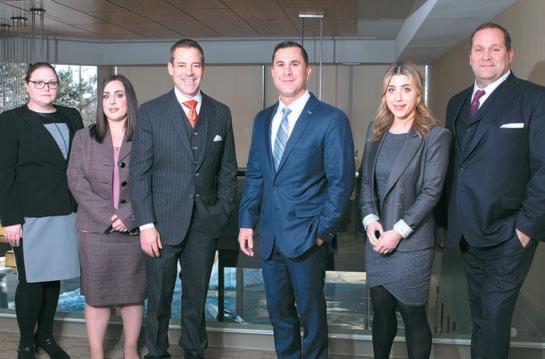
We are here for you and any of your legal needs during the COVID-19 outbreak.
michprobate.com
24725 West 12 Mile – Ste. 110 Southfield, MI 48034 1-248-945-1111
Residents of Birmingham, Bloomfield Hills, Farmington Hills, Franklin and West Bloomfield can have fresh challah from Johnny Pomodoro’s delivered to their doors Friday morning.
This is thanks to Isaac Mintz, 18, graduating from West Bloomfield High School, and his younger cousins Avery Gach, 13, a student at Berkshire Middle School, and Eli Gach, 10, who attends West Maple. Mintz lives in West Bloomfield; his cousins live in Bloomfield Hills.
It was Avery’s idea. “I know a lot of Jews don’t want to go into stores, especially older people,” he said. “My family has always loved celebrating Shabbat, and we understand the joy of challah on Friday evenings. So I thought about a challah delivery service.”
Last month, Avery reached out to his cousin Isaac for advice. “He is a very passionate, kind and hardworking young man — an entrepreneur who saw a need in the market,” Isaac said. “We began bouncing some ideas around.”
They came up with Door to Door Family Challah, a streamlined service to the community.
Here’s how it works: Customers fill out an order via a Google Form, then pay their total through Venmo. Once the payment has been finalized on Thursday afternoon before 2 p.m., they can expect their order on Friday morning. The charge is $6 for one challah or $10 for two.
Isaac, who plans on attending the University of Michigan this fall, is the delivery driver, helped by his sister Eden, 15, a student at West Bloomfield High School. “She has been invaluable in helping deliver the challahs,” Isaac said.
The challah comes freshly baked from Johnny Pomodoro’s in Farmington Hills. The cousins conferred with general manager Joe Montgomery, who was very receptive to working with the young people.
“We also wanted to do some good,” Isaac said. “Ten percent of earnings go toward coronavirus relief efforts.”
Their first week, Door to Door Family Challah served 22 families and made its first donation to FLAG of Metro Detroit.
One customer wanted to take a picture with the boys. “We were thrilled,” Isaac said. “We treat our customers like family and hope to have even more satisfied customers in the future.” For more information, email doortodoorfamilychallah@gmail.com.
Highway to Challah
Cousins ensure families can enjoy fresh challah on Shabbat. JACKIE HEADAPOHL ASSOCIATE EDITOR COURTESY OF AVERY GACH Eden and Isaac Mintz, and Avery and Eli Gach deliver challahs to customers on Friday morning in time for Shabbat.
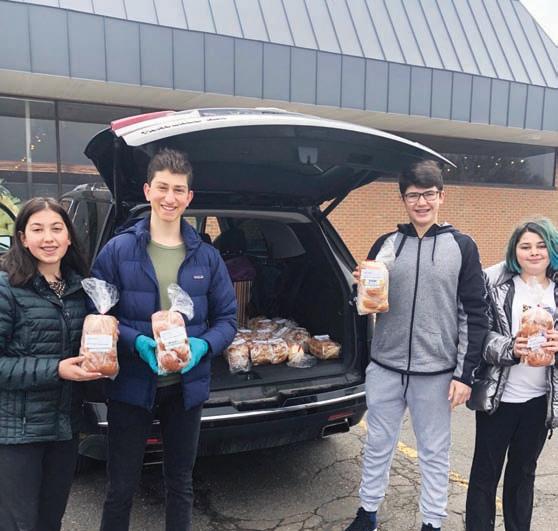
MICHIGAN STATE UNIVERSITY
GRADUATING MSU HEALTH CARE STUDENTS AID IN COVID-19 RESPONSE
As Michigan works swiftly to expand its health care workforce to battle the COVID19 pandemic, Michigan State University has made available hundreds of health care students who have successfully completed their program requirements to Michigan health care systems earlier than usual.
As a result of Gov. Gretchen Whitmer’s efforts to increase the speed at which health care professionals can enter the workforce, these health care systems will have access to 87 baccalaureate-prepared nurses, 61 medical doctors and 213 osteopathic physicians. MSU is working with the Department of Licensing and Regulatory Affairs in expediting the licensure of these health care workers.
“MSU has one of the largest training programs of health professionals in the nation,” says MSU Executive Vice President for Health Sciences Norman J. Beauchamp Jr. “We recognized early in the pandemic that additional providers would be needed. We actively pursued a pathway to make it possible. Adding more than 350 medical professionals to the health care workforce at this critical juncture will make a substantive difference in combating this virus. Together, everything is possible.”
Students in the colleges of Human Medicine and Osteopathic Medicine normally start their residencies July 1. With this licensing option, graduates could enter
MAY 14, 2020
Hundreds of MSU health care students who have successfully completed their program requirements are entering the workforce earlier than usual to help with Michigan’s response to the COVID-19 pandemic.
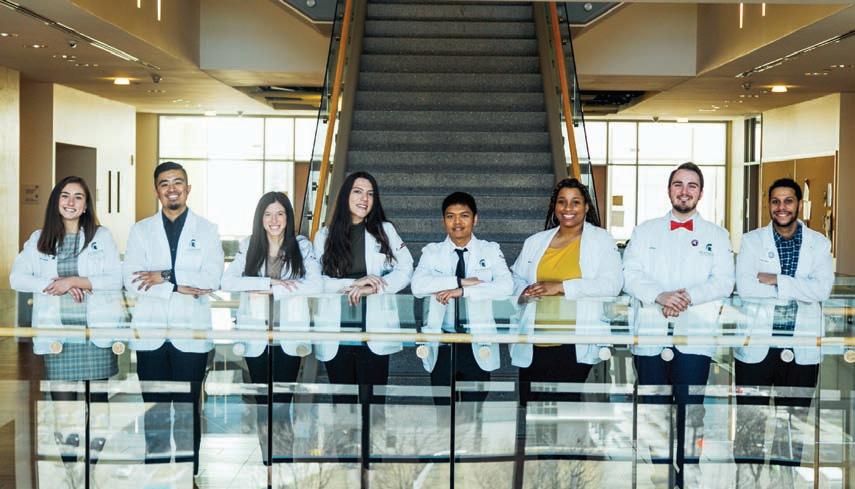
the workforce ahead of their scheduled residency — before the end of April. Each graduating student has completed eight years of college education and thousands of hours of clinical activity.
“The College of Osteopathic Medicine has been a leader among Michigan medical schools in the number of graduates that go on to practice medicine in the state,” says Andrea Amalfitano, dean of the College of Osteopathic Medicine. “Around 65% to 70% of our osteopathic medical students stay in Michigan to practice. The decision to expedite our graduates entering the physician workforce sooner in the face of the COVID-19 pandemic is something that furthers our long-standing goal, namely, to provide the state of Michigan great doctors who provide quality care for its residents.”
“Our newly licensed MDs are clinically experienced and well prepared to serve the needs of Michigan hospitals in this unprecedented health crisis,” says Aron Sousa, interim dean of the College of Human Medicine. “This initiative of rapidly increasing the number of physicians in our hospitals is a core part of MSU’s contribution to the COVID-19 effort in our communities throughout the state.”
Early licensing is also available for nursing students across Michigan. Before entering the workforce, nursing students normally are required to pass the National Council
Licensure Exam for Registered Nurses. However, LARA has set up a temporary license for students preparing to become registered nurses to allow MSU’s nursing students to become available as practicing registered nurses before taking the exam. At the end of their program in May, these graduating nursing students will have completed 740 contact hours through the nursing program. “Nurses are on the front lines of this pandemic, so it makes sense that the governor would create this opportunity for new nursing graduates to enter the workforce during this time of desperate need,” says Randolph F. R. Rasch, dean of the College of Nursing. “We need all the help we can get to provide the necessary and increasing amount of care for Michigan residents, and this is a bold first step by the governor.” e
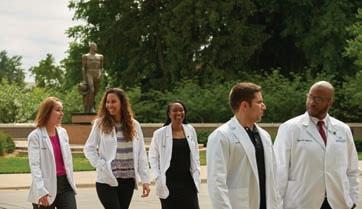
MSU has one of the largest training programs for health professionals in the nation.
Spartans collaborate to create 3D-printed medical face shields
MSU is helping local health professionals on the front lines of the COVID-19 pandemic caused by the novel coronavirus by making 3D-printed personal protective equipment.
To address the critical need for donations, medical face shields are being jointly produced with colleges across MSU’s campus, including Osteopathic Medicine, Engineering, Natural Science, Agriculture and Natural Resources, and Arts and Letters.
While MSU departments and labs already were donating existing supplies, one faculty member wondered whether new protective equipment could be created from scratch.
“This all stems from the Office of Environmental Health and Safety effort to bring together any and all PPE supplies that were unused in our labs to help local hospitals,” says Nathan Tykocki, assistant professor of pharmacology and toxicology in the College of Osteopathic Medicine.
With access to a 3D printer and time at home instead of at his lab, Tykocki was inspired to act. After searching the 3D-printing community online, Tykocki discovered a group in the Czech Republic that made a medical face shield validated by its government. The group’s design has been shared globally online.
“I just started emailing,” Tykocki says. “Brian Smith of EHS put me in contact with other professors and technicians from a myriad of different colleges and departments. I suggested that we should do these shields. The nice thing is these shields are reusable — the plastic can be disinfected without harming it in any way — so the shields are by no means a ‘one and done.’”
While the frame of the medical shields can be created with a 3D printer, the devices still require other components, including the clear plastic shield itself. Aaron Walworth, laboratory manager in the School of Packaging, had just the thing — a laser cutter to make the clear plastic pieces.
Walworth says he cut 132 shields one afternoon while others on the team with laser cutters were purchasing more of the plastic sheeting used to make the shields.
Brian Wright and John Papapolymerou of the College of Engineering have coordinated with Tykocki to use their 3D printers to create the frames. Tykocki also heard from the MSU Library, where someone suggested using the clear plastic covers for binders as one of the materials. MSU St. Andrews, a STEM education center in Midland, also stepped up with a daily capacity to print about 60 frames a day.
A final and crucial component needed for medical face shields is the elastic strap. Enter the Department of Theatre in the College of Arts and Letters. When Tykocki shared the need with his wife, Abigail Tykocki, theatre communications specialist in the college, she suggested contacting the MSU Costume Shop.
“We had a ton of elastic, because we buy stock to keep for whenever we need it,” says Angie Wendelberger, the costume shop supervisor. “I had four industrial rolls of elastic just hanging there that no one really could use.”
Wendelberger retrieved the elastic from the costume shop and brought it to the Tykockis’ home. “I was just glad that I could help in any way,” she says. “I’m not scientific, and I can’t make face shields with a 3D printer, but I can provide elastic.”
Tykocki is pleased with the collaboration. He says everyone involved in the production hopes to eventually make the shields available to health care providers statewide.
“This really shows me that collaboration is not limited at all to research,” says Tykocki. “It expands to every aspect of the university, and the willingness of people to work together to help when it’s needed. This is a true example of ‘Spartans Will.’” e
MSU Hillel creates virtual programming to support students
While Michigan State University’s response to the COVID-19 pandemic has required students to adjust to virtual classes and extracurricular activities, MSU Hillel also has created virtual programming so students can remain connected to Hillel staff and to one another.
MSU Hillel Associate Director Robyn Hughey has led the transition to online programming.
“Upon learning about the seriousness of the pandemic, our staff quickly worked to create a number of innovative online experiences and gatherings to help students across the state stay connected to Jewish life while at home,” says Hughey. “Since the creation of our online calendar in mid-March, we have pivoted some programming based on interest, but our dedication to supporting students has remained strong and is at the core of all that we are doing.”
Hughey and her team’s quick pivot helped students feel tuned in to everything the organization offers. Programs include online Jewish learning, making Jewish baked goods, engaging in mindful meditation, maintaining physical and mental well-being, and more.
“In addition to these programs, our staff has been working hard on personal outreach to students, and we have been scheduling virtual coffee dates,” says Hughey.
As far as formats go, Hughey and her colleagues have been using Zoom, Instagram’s IGTV, Instagram Live and Facebook Live to reach students around Michigan and across the country.
“Staff members are still available for phone and Zoom calls during regular hours so they could be there for students,” says Julia Levy, a junior and former executive member of the
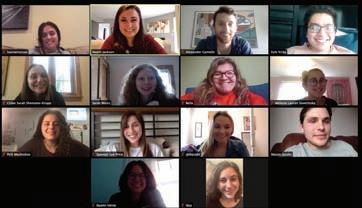
Students participate via Zoom in MSU Hillel’s virtual book club.
Jewish Student Union. Levy also mentions that to try to make things interesting, staff members have gone on MSU Hillel’s Instagram account to talk about their time in quarantine.
Another way students are staying connected to one another and to their faith is through a virtual book club, which is reading “Letters to My Palestinian Neighbor” by Yossi Klein Halevi.
“The book club has allowed me to connect not only with MSU students, but also with students from different schools and campuses across Michigan,” says Cooper Myers, a junior and former vice president of community programming at MSU Hillel. “These new connections bring new thoughts, ideas and perspectives that I did not have prior to reading the book.”
MSU Hillel’s goal is to maintain a sense of community during difficult times. The organization also hosted a virtual Passover Seder via Zoom. While the shift to virtual settings during the pandemic has temporarily disrupted daily life, MSU Hillel will continue to help students feel they have a home away from home and a connection to MSU. e
MSU epidemiologist part of national team pursuing COVID-19 treatment
Finding a treatment for COVID-19 is urgent, and a new effort coordinated by an MSU epidemiologist and colleagues around the country aims to use convalescent plasma, which is plasma from recovered patients, to treat the infection.
As part of the next step to advance the use of convalescent plasma for the treatment of COVID-19 infection, the National Convalescent Plasma Project has launched a website for health care providers, patients who have recovered from COVID-19 infection and want to donate plasma, and those considering the treatment.
Last month, the Food and Drug Administration expedited the compassionate use of convalescent plasma for care of seriously ill patients infected with coronavirus that causes COVID-19 disease. The use of convalescent serum involves taking the antibodies of those who have recovered and giving them to someone else who is fighting the virus. Epidemiologist Nigel Paneth, an MSU professor and member of the project’s leadership team, along with colleagues from Johns Hopkins University and the Mayo Clinic, led the development of the National Convalescent Plasma Project. The project includes 170 physician-scientists from 50 universities and hospitals across the nation studying the use of convalescent plasma in COVID-19 treatment and prevention.
Paneth also spearheaded the group’s website, ccpp19.org, which is hosted by MSU.
“We need to inform health care providers about the use of convalescent plasma and also reach recovered patients with an urgent plea to donate plasma,” Paneth says.
“Additionally, doctors will use the site to input data on how their patients respond to the plasma treatment. The hope is that we can move this potentially lifesaving therapy to controlled clinical trials and then to wider use if effectiveness is demonstrated as quickly as possible.
“As of April 1, more than 1,100 plasma donors have registered, but we need more,” Paneth says.
“Small studies in China during the recent outbreak of COVID-19 suggest, but do not prove, that convalescent plasma improved outcomes. Until randomized trials are completed in the future, we will not know for sure that it works, in what circumstances and for whom, but we’re hopeful.” e
Eleven MSU graduate programs rank in the top 15 nationally, according to 2021 U.S. News & World Report rankings.
Catch up on the latest from MSU msutoday.msu.edu Explore giving opportunities givingto.msu.edu Learn more about alumni participation alumni.msu.edu Your comments are welcome. Write to Michigan State University, 408 W. Circle Drive, Room 302, East Lansing, MI 48824 or call (517) 355-7505.
MSU community bands together to help students in need
As the COVID-19 pandemic continues to disrupt daily life, hundreds of Michigan State University students and families are relying on the MSU Student Food Bank for sustenance and emotional support.
Unsurprisingly, the MSU community has rallied. Contributions of time and resources from across campus resulted in serving more than 750 MSU students and families and an additional 150 community members in local shelters during a single weekend in March.
Chefs from MSU Culinary Services and the Spartan Hospitality Group helped with preparation and distribution plans after Residential and Hospitality Services stepped in with surplus food from cafeterias.
“There was no reason to let that food go to waste when it could be given to people in need,” says Vennie Gore, vice president for MSU Auxiliary Enterprises. “We recognize many students rely on the university for more than just education. For some, we also represent a safe space to live with reliable meal service. Taking measures to keep our community healthy and safe during an outbreak doesn’t mean we stop being a resource for our students.”
Due to the need for increased social distancing, food bank services are now being offered through 20-minute appointments. As a result, the food bank is continuing to serve about 24 individuals and families daily.
CREATING A SPARTAN SAFETY NET Meanwhile, many Spartans are reaching out to University Advancement to ask how to help those in the MSU community who may be struggling during the pandemic.
The Support Our Spartans Student Emergency Needs Fund is one of several ongoing funds providing critical support for students. Right now, it is helping students who have lost jobs, who are unable to return home or who face other financial challenges because of the pandemic.
As of early April, more than 1,100 donors have contributed nearly $79,000 to emergency assistance funds for students in need.
“It is impressive and gratifying to see how Spartans are looking out for one another,” says President Samuel L. Stanley Jr., M.D. “Many in our community are experiencing financial difficulties, and your support is providing a lifeline when they need it most.”
HOW TO HELP
For a list of MSU emergency funds and places in need on campus, visit go.msu.edu/safety-net. e
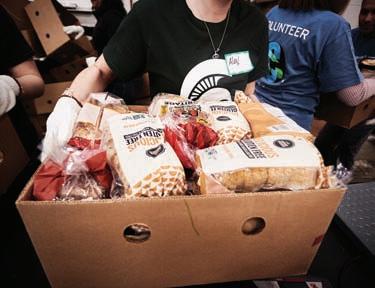
Spartans on campus and around the country are volunteering at food banks to meet the food needs of their communities, including at an alumni service day in Denver.
Zoom Crew


Over the past six weeks, Bloomfield resident Allison Kaplan has grown her “Zoom Crew” workout sessions from 10 to more than 659 subscribers. The workouts not only provide participants with an outlet to release stress and anxiety, but also give a new sense of community.
Kaplan started teaching fitness classes when she was 22 and has been a fitness instructor for more than 40 years. She has taught at the Jewish Community Center and at different gyms around Metro Detroit.
“I learned early on that it wasn’t just about exercise and teaching people how to move their bodies and get strong,” Kaplan said. “It became more evident to me as I got older that I was developing these wonderBuilding community through Zoom workouts. CORRIE COLF STAFF WRITER
Game Night! Local BBYO organizes a virtual Bingo night for JARC residents.
Sometimes plans change due to things out of our control.
My name is Shayla Mostyn. I’m a 10th grader at Frankel Jewish Academy and shlicha of my chapter Ruach BBG of BBYO. As shlicha, I am in charge of Jewish programming and community service for my chapter.
After putting together ideas for upcoming events in the New Year 2020, it became harder and harder to keep or to plan for these events due to COVID-19. There was one planned event I couldn’t let go of and wanted to see through.
Back in September 2019, I saw a flyer for JARC with dates available. I did not waste any time. I immediately got in contact with my chapter’s president and worked out a date that would be best for us to plan an event. I then emailed Jessica Tierney, JARC’s community engagement manager, that Ruach would like to volunteer for JARC bingo on April 21, 2020. For seven months I stayed in contact with Jessica, making sure that this event would go off without a hitch.
I collected prizes and kept in contact with everyone, letting everyone know this event wasn’t going to be cancelled. I invited Jessica to one of our chapter meetings to talk about what to expect and how we could make this event enjoyable for JARC residents.
As the date was getting closer and COVID-19 was putting everyone in quarantine, I asked Jessica if our bingo event was cancelled. Luckily, she said it wasn’t, but if we wanted it to continue, we needed to figure out how to make it work. I got to talking with my chapter, bouncSHAYLA MOSTYN CONTRIBUTING WRITER
ful relationships with people, especially women.”
The idea to start these Zoom workouts came to Kaplan when COVID-19 began to hit Michigan. Due to her compromised immune system, Kaplan was one of the first instructors sent home from the fitness clubs she was teaching at.
“I knew I was going to miss all my friends and the people I exercised with. I knew I had to do something,” Kaplan said. “I didn’t want to workout by myself because it is so much better feeding off each other’s energies.”
Kaplan enlisted the help of her two lifelong friends, Marni Stone and Nancy Powell, to help her grow the “Zoom Crew” and teach some classes. Stone and Powell have also been fitness instructors for more than 40 years.
Once she began the workouts, she decided to send out the Zoom link to a couple of her close friends and students that she knew would want to participate. From there, her classes grew tremendously from just 10 people to over 659 subscribers, some from different states.
Kaplan’s “Zoom Crew” simply spread from word of mouth. People interested in joining this workout crew simply send Kaplan an email (askaplanpt@ gmail.com) to get put on her subscriber list so they can receive each day’s workout schedules. Participants can also directly sign up using a MailChimp form.
Her classes are completely free and there is also no fee to join. Kaplan offers anywhere from 12-15 classes a week, giving options for participants to choose from morning, mid-day or late afternoon classes.
Classes vary from strength, pilates, cardio, yoga, barre fusion, dance classes and much more. Most classes last around 30 minutes, and Kaplan makes sure that all classes appeal to her crew members.
ing ideas off them and soon we figured out our plan.
On April 21, we had a virtual JARC Bingo over GoToMeeting, where Ruach volunteers wrote down and called out a letter and number, then showed it to the camera for the residents to see and mark down. To our surprise, we had 14 homes and a ton of people playing. During that hour, we played three games, and nobody wanted it to end!
In this time of isolation where our only gatherings and events are done virtually or 6 feet apart, we can still smile, laugh and enjoy an evening together.
I’m glad that all the hard work
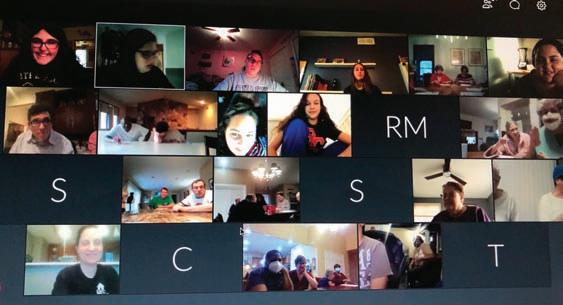
Jessica and I did to make sure this wasn’t postponed or worse, cancelled, turned out perfectly. The winners had their prizes dropped off at their homes, and we all closed the event feeling a sense of pride. Being able to do community events, like Bingo or a simple game night with family and friends, help keeps us connected.
As blogger Many Hale said, “To make a difference in someone’s life, you don’t have to be brilliant, rich, beautiful or perfect. You just have to care.”
To plan future events with JARC, contact Jessicatierney@Jarc.org.
APRIL 14, 2020
Kourtney Spaulding, formerly of Farmington Hills, and Cory Duchesneau, of Oxford, Ohio, are overjoyed to announce the birth of their daughter, Arya Leora Duchesneau. Sharing in the long-distance excitement are grandparents Shelley and Ray Spaulding of Farmington Hills, and Stephanie Duchesneau and Shawn Duchesneau of West Hartford, Conn. Excited are maternal great-grandmother Claire Raminick of Southfield, and paternal great-grandparents Earleen and Jerry Duchesneau of Connecticut. Arya Leora is named in loving memory of her maternal great-grandfather Leo Raminick
Daniel
Michaelson of Huntington Woods will become bar mitzvah at
Congregation
Shaarey Zedek in Southfield on May 16, 2020. Participating in the ceremony will be his parents, Jodi and Jefferey Michaelson, and siblings Connor, Dalia and Noah. Proud grandparents are Lois and Cyril Levenson, and Jackie and Ronald Michaelson.
Daniel is a student at Cranbrook in Bloomfield Hills. His mitzvah project is volunteering at PeerCorps.
Jonah David
Wittenberg will become a bar mitzvah on Saturday, May 16, 2020, at home through Zoom with Adat Shalom clergy. Joining him in his celebration will be his parents, Marc and Stacey Wittenberg; brothers, Sam and Zachary; and grandparents, Ronald and Anita Taylor, and Eileen and Sidney Bradley.
Jonah is a seventh-grade student at West Hills Middle School. One of his favorite mitzvah projects was his annual participation in the JARC Chanukah party with his team of volunteers.
Epstein 50th M arjory and Donald Epstein of Bloomfield Hills will celebrate their 50th wedding anniversary on May 23, 2020. They were married at Franklin Hills Country Club in Franklin. The couple is deeply loved and cherished by all who know them, especially their adoring children, Lena Epstein, Lilly and Alex Stotland; and grandchildren, Nathan Stotland, Elise Stotland and Emma Medwed. In spending the last five decades of their lives together, they feel incredibly blessed to continue to have each other and to have built a rich and meaningful life.
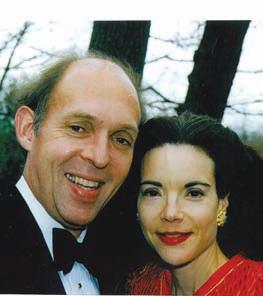
Pasman 100th M yra Frank Pasman, formerly of West Bloomfield, turned 100 years young on May 1, 2020. She often entertains friends with her piano playing and beats them regularly at bridge. She is living in Scottsdale, Ariz., with her daughter and son-in-law, Sheila and Larry Landau. Myra has a close and loving relationship with her daughter-in-law, Hulya Erol-Garvett; grandchildren, Amy Schaeffer of Arizona, Julie Landau Young of San Francisco; great-grandchildren, Maddy Sheafer of Arizona, Jacob and Eve Young of San Francisco and Michael Garvett of Illinois; her stepchildren, Nora Pasman-Green, JoEllen Warner, Daniel Pasman, Eric Pasman and Molly Pasman; and as well as her nieces, Nancy Pasman Satovsky, Barbara Saltz and Dolores Harris.
Babayov-Safran
The intermediate days of Passover were filled with happiness as we celebrated our freedom and redemption and we commemorated our new lives post slavery. Our beautiful tradition teaches that one’s “cup should overflow.” So it is with immense gratitude, excitement and pure happiness that we share that our cup is indeed overflowing with joy and extraordinary enthusiasm. Esther Babayov and Hy Safran are blessed to announce they are engaged to be married.
The kallah (bride) is the daughter of Rabbi Sander and Sarah Babayov. The chattan (groom) is the son of Diane Steinman and Jim Safran.
The couple intend to celebrate their marriage this summer and will then reside together in Greater Detroit as active members of our Jewish community.
A Brave New World?
What kind of world will exist “at the end of the days,” the period of the Messiah and human redemption?
The opening of the Torah portion harkens the messianic dream, the goal of human history. God promises the Israelites that if they maintain His laws and commandments, their physical needs will be taken care of. “I will cause evil beasts to cease (v’hishbati) from the land; neither shall the sword go through your land.”
How are we to understand “cause to cease”? Rabbi Yehuda defines v’hishbati as God causing these “evil beasts” to disappear from the world, that God will destroy them. However, Rabbi Shimon interprets the word to mean that God will cause their evil nature to be destroyed.
How does Judaism deal with the problem of evil in the world? Is it an objective force which must be destroyed, or can even evil be uplifted and redeemed if we perceive the positive essence of every aspect of creation and utilize it for good? Rabbi Shimon truly believes that the task of the individual is to sanctify everything; he maintains virtually everything can be brought within the domain of the sacred.
On the other hand, Rabbi Yehuda is not so optimistic and recognizes evil. Hence he emphasizes the biblical command “and you shall burn out the evil from their midst.”
The period between Passover and Shavuot is the count of days between the physical and incomplete redemption of the broken matzah and our advancement to the spiritual, all-embracing redemption of the Torah we received at Sinai. The cĥametz (leavening) is the symbol of raw emotions and physical instincts; it “ceases to exist” by destruction on Passover.
On Shavuot, however, it will be sanctified. What was evil seven weeks ago has now been redeemed. If anything, Shavuot is a manifestation of the redemption of evil, of our vision of the possibility of dedicating every aspect of our existence to God.
Rabbi Yehuda insists on a time when all that is evil will be obliterated from the Earth; Rabbi Shimon maintains the fundamental nature of the world will not change, wild animals will still roam the forests, but their force and vigor will be utilized positively.
Rabbi Yehuda sees the millennium as devoid of Amalek, the nation bent on the destruction of Israel; our Bible commands us to “destroy the memory of Amalek.” Perhaps Rabbi Shimon would see the millennium as being devoid of the memory of the ancient Amalek, for Amalek at that time will repent and convert to Judaism.
Does our Talmud not record that the grandchildren of Haman (the Amalekite) taught Torah in Bnei Brak? I pray for the vision of Rabbi Shimon and for the sanctification of every aspect of our lives and our nature. Rabbi Shlomo Riskin is chancellor of Ohr Torah Stone and chief rabbi of Efrat, Israel. Parshat
Behar/ Bechukotai: Leviticus 25:1-27:34; Jeremiah 16:19-17:14. Rabbi Shlomo Riskin
Throughout South Florida, Including Boca, Boynton, Delray, Broward and Miami-Dade Counties
Let Old Friends be your Michigan-Florida Connection
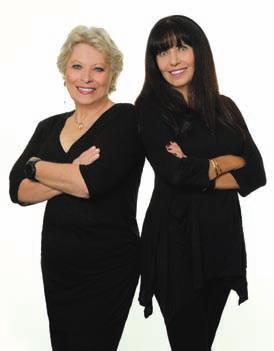
Nina Spinner-Sands
NinaSpinner-Sands@keyes.com (954) 290-8293
Rita Morse
RitaMorse@keyes.com (305) 609-7559
Estate Property Sales from Listing to Clean-Out! BUY • SELL • INVEST




